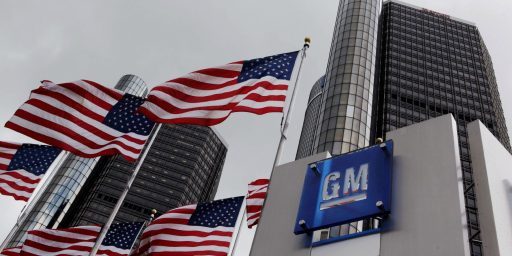GOP May Scuttle Auto Bailout
The auto industry bailout looks to be in trouble again.
WASHINGTON (AP) – Emergency aid for the nation’s imperiled auto industry was thrown into jeopardy Wednesday, opposed by Republicans who were revolting against a hard-fought deal between Democrats and the Bush White House to speed $14 billion to ailing carmakers.
Democrats detailed the compromise measure and laid the groundwork for quick votes on it, holding out hope the bailout could be enacted by week’s end. But a growing number of GOP senators declared they would not go along.
The White House, though not formally endorsing an agreement with congressional Democrats, dispatched administration officials to Capitol Hill to make a case for the rescue package. During a contentious, closed-door luncheon with Senate Republicans, they got an earful of criticism from the rank-and-file, some of whom have already announced plans to block the measure.
[…]
The plan would create a government “car czar,” to be named by President George W. Bush to dole out the loans, with the power to force the carmakers into bankruptcy next spring if they didn’t cut quick deals with labor unions, creditors and others to restructure their businesses and become viable.
Congressional Republicans, left out of negotiations on the package, blasted it. Their opposition reflected the tricky task of enacting yet another federal rescue in a bailout-weary Congress, with Bush’s influence on the wane.
I think this is probably a good thing. After all, part of the deal includes possibly forcing the car companies into bankruptcy. Why wait. If these companies are in that much trouble and they just can’t cut in the market, then bankruptcy is for them. They will get reorganized, renegotiate with their creditors, and cut new deals with labor unions, etc. And they’ll do all of this without having to grab a bunch of tax payers dollars.






I’d prefer the bankruptcy path. A “car czar” would only be amusing for its absurdity.
For everyone…a smartcar for two.
Notice the UAW has not given a dime. All they have done is delay what they think they should get. The UAW has priced themselves out of the market. I watched a video of a guy on the assembly line with a hose filling reservoirs of some sort. He was getting $71 an hour. The skill required to do that was nil. I do not understand why management agreed to such wages. Some of the UAW workers get paid for not working. I say you are entitled to all you can get but when it goes over the top, you have to pay the price, not me.
According to the NY Times:
Doesn’t seem like bad work,
I refuse to support an auto bailout when the CEOs, in times of life-and-death for their companies, wasted all that time driving to Washington D.C. They should come back to the Capitol by public air, demonstrating the seriousness of the occasion. Or maybe they should crawl from Detroit on their hands and knees.
I don’t know; all I know is Congress seems to be attuned only to the theatrical presentation of the request for tribute.
They should have shown real commitment… and bicycled.
I am sick of bailouts period. If they fail, sure it will hurt, but if we save them now, will they really do what it takes to restructure their industry?
This is not a bailout. A bailout signifies some hope of returning to a viable ongoing concern. This is artificial life support, keeping the body alive when the brain is dead.
Is their an actual plan, idea, or hallucination of how the Big 3 will ever return to breaking even much less make a profit?
Before we are overcome with our joy over the workings of creative destruction, I think we should remember that the indigent are going to end up as public responsibilities.
As I see it the problem we are facing is that for the last eight years our economy hasn’t been creating enough jobs and the jobs that have been created have been very dependent on the government since many of them have been government jobs or jobs in the government’s handmaiden industries, education and healthcare. The number of jobs created has barely kept up with natural increase, if that.
This year alone nearly a million and a half net jobs have been lost. We haven’t created that many net new jobs over the period of the last twelve years. What mechanism will enable us to create that many new jobs?
The creative part of the destruction should be right-sized US brands.
But still we have the globalization story beneath it all:
Sony to Close Last US TV Factory
It would be a good story if quality US jobs came out of a bankruptcy restructuring … but we seem to be taking a gamble that US workers will maintain their elite position on their merits, rather than simply historic access to health, wealth, and education.
Could you expand on that, odograph? I’m not sure what you mean or how it relates.
Hi Dave, I was really just speaking to the the idea that bankruptcy equals going out of business. There seem to be people who see an end to the US car industry, meaning no big-three plants in operation.
A breakup could mean smaller companies, more specialized makers, and plants running … even if they aren’t be-everything-to-everybody. Take Saturn for instance. I thought they had real possibilities as GM’s “small car brand.” For a variety of reasons (including pressure from Saturn dealers an other GM dealers) they made Saturn what everyone else was .. an “everything” brand. Small cars, minivans, suvs …
Another way to look at it is that in the early 20th century the US had many, many, auto brands. They were amalgamated into the big 3 titans. Maybe some disamalgamation is in order.
Odo I think you are right at least in that the answer for the industry is likely, or at least should IMO, to be found in creating more niche market cars/trucks etc. Choosing one or two types and excelling at those would seem better than having 20 different models with similar models under two different makes, and none of them necessarily what anyone wants.
I don’t think government is the answer to the problems, and government intervention is likely not going to help correct the roblems within the industry. I think in the end some people will lose their jobs, some people will lose their business, but just handing the industry billions of dollars isn’t going to make them actually evaluate and reorganize in a way that fixes the problems.